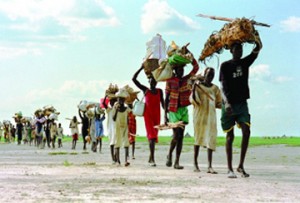 South Sudan was born out of conflict following 2 civil wars and a coup. As Sudan gained it’s independence in 1955 from Egypt and British rule. Anticipating that coming independence of Sudan the Southern regions worried the northern region with closer ties to Egypt would retain control. While the north population favored Islam, the south was predominately Christian creating a tension over religious freedom.
South Sudan was born out of conflict following 2 civil wars and a coup. As Sudan gained it’s independence in 1955 from Egypt and British rule. Anticipating that coming independence of Sudan the Southern regions worried the northern region with closer ties to Egypt would retain control. While the north population favored Islam, the south was predominately Christian creating a tension over religious freedom.
The first Sudan civil war lasted until 1972 when the Addis Ababa Agreement was made creating an autonomous southern region and a ten-year hiatus of conflict between the north and south. This conflict would be rehashed in a second civil war in 1982 when the north disregarded the agreement and created a federated Sudan, and began imposing Islamic law across all of Sudan, including the southern region.
The war went on for over 20 years resulting in over 4 million people displaced and 2 million dead. With the help of the United Nations, peace came in 2005 as a new agreement gave the south 6 years of running autonomously again followed by a vote to determine if they should be allowed to form their own country.
 From January 9th to 15th 2011, a referendum took place in the Southern Sudan and hung on the question whether or not the region should remain a part of Sudan, or become completely independent. The referendum took place because of the Naivaha Agreement between the Khartoum government and the SPLA (Sudan Peoples Liberation Army).
From January 9th to 15th 2011, a referendum took place in the Southern Sudan and hung on the question whether or not the region should remain a part of Sudan, or become completely independent. The referendum took place because of the Naivaha Agreement between the Khartoum government and the SPLA (Sudan Peoples Liberation Army).
On February 7th 2011, the referendum commission calculated the final results. A staggering 98.83% voted for independence for the South Sudan. While the ballots were suspended in 10 of the 79 counties, they exceeded 100% of the voter turnout. The required turnout was 60% and the number of votes well exceeded this. The number of votes for independence was overwhelming. The determined date for the South Sudan to become an independent state was July 9th 2011.
Religion played a huge role in why the South Sudan fought for their freedom. Christians have noted that “[there is a] climate of chronic discrimination against Sudanese Christians and other minorities”. The primarily Islamic government of Sudan persecuted and even withheld Christians from leaving during the times of civil war. The Southern Sudan, now free from religious intolerance, is able to practice and preach Christianity in a variety of ways, with out the fear of harm.
Today South Sudan is rebuilding from the years of war. They have adopted English as the national language, and have earned their religious freedom. LifeStreams, which started out in the United Nations Refugee camps in early 2000, has played a major roll in helping to promote Christianity through out South Sudan. To Learn more about Lifestream’s history in the South Sudan click here.

